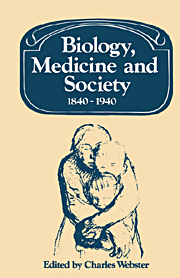Book contents
- Frontmatter
- Contents
- Contributors
- Preface and Acknowledgements
- Introduction
- 1 Women's Health and the Women's Movement in Britain: 1840–1940
- 2 Working-Class Mothers and Infant Mortality in England, 1895–1914
- 3 Theories of the Cell State in Imperial Germany
- 4 Innate Character in Animals and Man: A Perspective on the Origins of Ethology
- 5 Genetics in the United States and Great Britain 1890–1930: A Review with Speculations
- 6 Eugenics and Class
- 7 Sociobiologies in Competition: The Biometrician–Mendelian Debate
- 8 Psychologists and Class
- 9 Measuring Intelligence: English Local Education Authorities and Mental Testing 1919–1939
- Index
Introduction
Published online by Cambridge University Press: 02 December 2009
- Frontmatter
- Contents
- Contributors
- Preface and Acknowledgements
- Introduction
- 1 Women's Health and the Women's Movement in Britain: 1840–1940
- 2 Working-Class Mothers and Infant Mortality in England, 1895–1914
- 3 Theories of the Cell State in Imperial Germany
- 4 Innate Character in Animals and Man: A Perspective on the Origins of Ethology
- 5 Genetics in the United States and Great Britain 1890–1930: A Review with Speculations
- 6 Eugenics and Class
- 7 Sociobiologies in Competition: The Biometrician–Mendelian Debate
- 8 Psychologists and Class
- 9 Measuring Intelligence: English Local Education Authorities and Mental Testing 1919–1939
- Index
Summary
Modern biology and medicine are inescapably involved with questions of policy and politics. The essays comprising the present volume explore major dimensions of this interrelationship. The authors demonstrate convincingly that cross-currents between the arenas of biological and social thought have persisted into the present century, notwithstanding the apparent greater isolation, sophistication and objectivity of the modern experimental sciences. The current sociobiology debate is merely the most recent manifestation of this interaction. It is by no means lost on participants in the many-sided controversy surrounding sociobiology, that generic sources for their respective views may be located at various points within the modern scientific movement, Darwinian evolutionary theory being outstandingly important. When, in an isolated and intentionally inscrutable remark in the Origin of Species (1859), Darwin conceded that “light will be thrown on the origin of man and his history” he was inaugurating a new phase in the continuing debate concerning the relationship between the biological and social sciences. The novelty of evolutionary language failed to obscure the deeper historical roots of ideas concerning the relevance of evolution to social thought. Indeed the programme for deducing political principles from the experimental sciences is virtually concomitant with the scientific movement.
Problems of population have provided an important occasion for the transference of ideas between the scientific and political areas. The whole rise into industrialization of Western Europe has been accompanied by theorizing concerning the relationship, between wealth and population. The sciences provided a stimulus for data gathering in the fields of economics and population and they evolved tools for mathematical analysis of these data. Natural philosophers contributed freely to economic and population theory; their speculation and analysis periodically questioned the ability of western
- Type
- Chapter
- Information
- Biology, Medicine and Society 1840–1940 , pp. 1 - 14Publisher: Cambridge University PressPrint publication year: 1981

